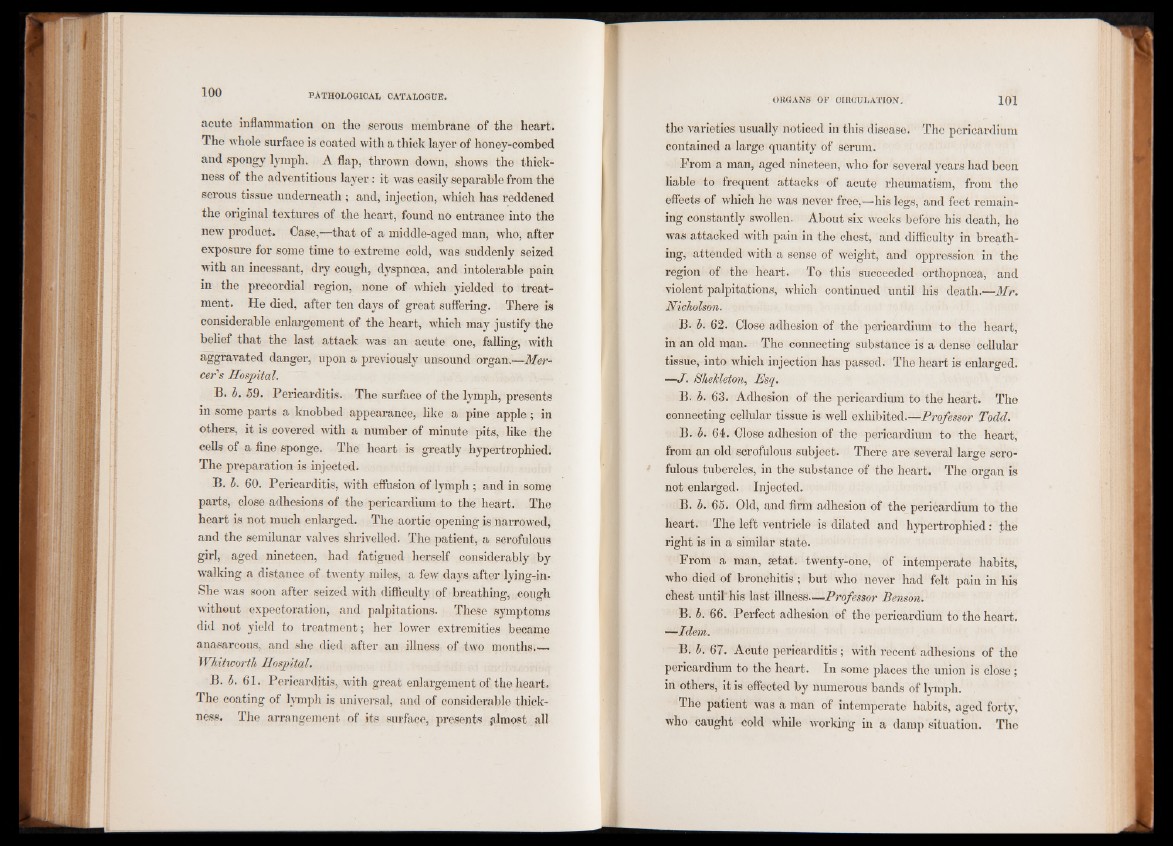
acute inflammation on the serous membrane of the heart.
The whole surface is coated with a thick layer of honey-combed
and spongy lymph. A flap, thrown down, shows the thickness
of the adventitious layer: it was easily separable from the
serous tissue underneath ; and, injection, which has reddened
the original textures of the heart, found no entrance into the
new product. Case,—that of a middle-aged man, who, after
exposure for some time to extreme cold, was suddenly seized
with an incessant, dry cough, dyspnoea, and intolerable pain
in the precordial region, none of which yielded to treatment.
He died, after ten days of great suffering. There is
considerable enlargement of the heart, which may justify the
belief that the last attack was an acute one, falling, with
aggravated danger, upon a previously unsound organ.—Mercer's
Hospital.
B. b. 59. Pericarditis. The surface of the lymph, presents
in some parts a knobbed appearance, like a pine apple; in
others, it is covered with a number of minute pits, like the
cells of a fine sponge. The heart is greatly hypertrophied.
The preparation is injected.
B. 1. 60. Pericarditis, with effusion of lymph; and in some
parts, close adhesions of the pericardium to the heart. The
heart is not much enlarged. The aortic opening is narrowed,
and the semilunar valves shrivelled. The patient, a scrofulous
girl, aged nineteen, had fatigued herself considerably by
walking a distance of twenty miles, a few days after lying-in-
She v 'as soon after seized with difficulty of breathing, cough
without expectoration, and palpitations. These symptoms
did not yield to treatment; her lower extremities became
anasarcous, and she died after an illness of two months.-—
Whitworth Hospital.
B. b. 61. Pericarditis, with great enlargement of the heart.
The coating of lymph is universal, and of considerable thickness.
The arrangement of its surface, presents almost all
the varieties usually noticed in this disease. The pericardium
contained a large quantity of serum.
From a man, aged nineteen, who for several years had been
liable to frequent attacks of acute rheumatism, from the
effects of which he was never free,—his legs, and feet remaining
constantly swollen. About six weeks before his death, he
was attacked with pain in the chest, and difficulty in breathing,
attended with a sense of weight, and oppression in the
region of the heart. To this succeeded orthopnoea, and
violent palpitations, which continued until his death.—Mr.
Nicholson.
B. b. 62. Close adhesion of the pericardium to the heart,
in an old man. The connecting substance is a dense cellular
tissue, into which injection has passed. The heart is enlarged.
—J. SheHeton, Esq.
B. b. 63. Adhesion of the pericardium to the heart. The
connecting cellular tissue is well exhibited.—Professor Todd.
B. b. 64. Close adhesion of the pericardium to the heart,
from an old scrofulous subject. There are several large scrofulous
tubercles, in the substance of the heart. The organ is
not enlarged. Injected.
B. b. 65. Old, and firm adhesion of the pericardium to the
heart. The left ventricle is dilated and hypertrophied: the
right is in a similar state.
From a man, getat. twenty-one, of intemperate habits,
who died of bronchitis; but who never had felt pain in his
chest until'his last illness— Professor Benson.
B. b. 66. Perfect adhesion of the pericardium to the heart.
—Idem.
B. b. 67. Acute pericarditis; with recent adhesions of the
pericardium to the heart. In some places the union is close;
in others, it is effected by numerous bands of lymph.
The patient was a man of intemperate habits, aged forty,
who caught cold while working in a damp situation. The